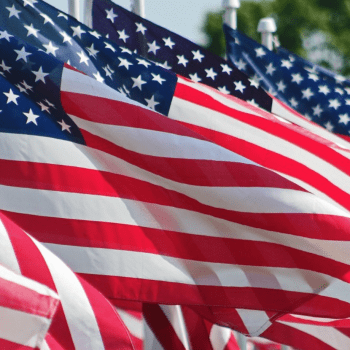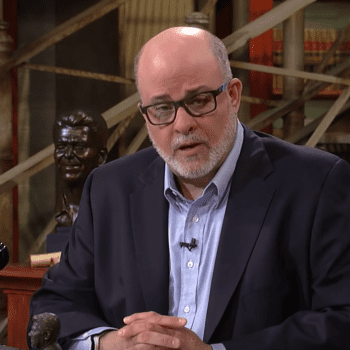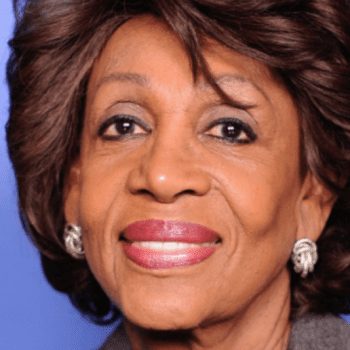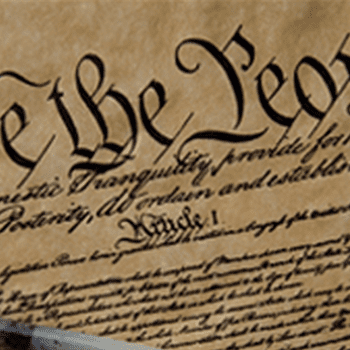It’s not been invoked before, but Article V of the United States Constitution provides for states to be a check on the federal government, to reduce federal spending and even reduce the power and jurisdiction of the federal government. Early steps are already being taken to hold a Convention of States. Dan Gilligan sat down with Correspondent Michael Hill.
Hill: Dan, thanks for talking to us. I want to ask you this. How does the Convention of States work?
Gilligan: Well, Convention of States is a method by which state legislatures can essentially act as a check on the federal government. It’s constitutionally prescribed in Article V, and the way that it works is that the states have to agree that they want to have a convention, or a meeting, about a uniform topic. Our topic, or application item, is that we seek for the states to get together to have this meeting to discuss ways in which we can reduce federal spending, reduce federal power and jurisdiction, and consideration of term limits at the federal level, so that we have that uniform language throughout the country in all the various states. Twelve states have passed that resolution. And the way that it works is that once we get, and this is according to Article V of following the recipe that’s in the Constitution, once we get to that two-thirds threshold of 34 states, then we simply call a meeting. We’ve really done nothing at that point except we’ve stated that the states think that they need to get together to consider amendments to the Constitution addressing one or all of these three items.
Hill: And then even though the states who didn’t necessarily vote for this, they can still send delegates so you’ll have votes from all 50 states.
Gilligan: That’s absolutely correct. It doesn’t matter which mix of the two-thirds of the states. Everybody is invited to that meeting.
Hill: And what happens after that? You get to this convention and then you have 50 voting delegates there, how many of those delegates have to vote in order for you to say, ‘OK, this resolution is adopted, this resolution is adopted and we can move forward.’
Gilligan: Yes, it will be quite an amazing exercise once we get all of these states together to consider amendments to these three application items. And, the way that it works is that the states will determine which commissioners, as they refer to them, they will send as their representatives. Each state, while they’re there, will get one vote, so in order for something to come out of there it simply has to be a majority of the 50 states. And that I think really is kind of the easy part. This was set up so that the states could use their constitutional authority that’s granted to them to act as a check on the federal government. It’s never been done before, and many people think that, you know, part of the reason why we have the condition of the federal government that we do now, you know the $20 trillion in debt. That’s why I’m involved as a volunteer. I just see the trajectory of the country from a financial perspective to not be good. So, that was set up in the Constitution of the states having this authority to act as a check on the federal government.
Hill: And once you vote, say the vote on some of these resolution items 26 to 24, that’s the majority that you talk about. What happens after that? Is it still up to Congress to do something or can the states vote to say we’re amending the Constitution?
Gilligan: Frankly, it’s the latter. And the beauty of this, and what makes it very attractive and really rather elegant and powerful, is that once that convention takes place, this is something that is autonomously run by the states, and it was designed so that neither Congress, the Executive or the Judiciary could have input to this. The reason is because this point of Article V was really, we think, set there with the expectation that the federal government would simply start to do more than it was ever intended to do. So the states are unique in actors across government because it is the states, and we don’t realize how powerful the states are, but it is the states only who can actually amend the Constitution all by themselves. Congress can start it, they need the states to ratify. The Judiciary can’t do it, the Executive can’t do it, but the states can do it all by themselves. So whatever comes out of this meeting at the Convention of States, and as you say they vote on it, everybody votes, whatever work product essentially comes out of that, then what happens is it gets approved by the states. But, these gentlemen a couple hundred years ago thought this through very well. It doesn’t get just approved by a majority of the states, or even by two-thirds of the states, the 34 that was needed to call the meeting, it has to get approved by three-quarters. So very, very hard to do, but you know what, we’re doing something very big, something very powerful and important and it shouldn’t be easy.
Hill: How far along are you in this process? Twelve states now have voted, nine houses in these individual states. How far along are you?
Gilligan: Well, I as a volunteer had been working with Convention of States for about two years. We’ve been in business, so to speak, as a project for approximately four years. We have over 3 million supporters, people who’ve signed the petition across the country, we have the 12 states, we are active in 50 states. From what I understand, and I am an amateur rookie at this stuff, but for a grassroots organization, our growth and success has been really impressively rapid.
Hill: How about New Jersey? Where does New Jersey stand with this?
Gilligan: Well, in New Jersey we have over 17,000 people who’ve signed the petition. We have a great leadership team. We have guys like Gary and Bill in Trenton today, very active people. We have over a thousand people who’ve indicated that they’ll volunteer with us in some way. We really have probably have about 25 people who are spending a fair amount of time doing this. We have a concurrent resolution in the New Jersey State House. We have some sponsors who are very supportive and passionate about trying to get this done.
Hill: Dan, let me ask you this question. This is essential because people listening to this will say, ‘OK, if Congress can do this, why do we need a Convention of the States?’ Let me be blunt, this effort doesn’t trust Congress. This effort doesn’t think Congress has the will to get done what you want done?
Gilligan: You’re exactly correct and that doesn’t make Congress bad. This was anticipated by the founders. Remember, the Constitution is a very, very cogent document. There’s eight articles in the Constitution, one of which is where they all just sign their name and say, ‘Yeah, we approve this.’ So, Article V exists there for a reason, and the reason was that just how we have that same system of checks and balances that we’re very familiar with at the federal level between the Executive, Judiciary and Congress, there was intended to be that same dynamic between the states and the federal government.
Hill: To reign in the federal government.
Gilligan: To act as a check and help the federal government not get off the rails. So, for example, the checks and balances exist between Congress and the president, the president and Congress. For example, the president has the veto power. Well, where would we be if the president simply never used that, and he was really just the figurehead and powerless. Well, it’s analogous to where the states are at, we haven’t used this tool. It’s interesting, people have posited that if you were to tell Thomas Jefferson and George Mason that, ‘Hey, you know, this has never been used,’ they would say, ‘Well, guys, what are you dealing with? Things must not be too good.’ I think they may have been right about that.
The above was originally published on NJTVonline.org, New Jersey’s public broadcasting station.










